Deborah J. Ross's Blog, page 89
February 7, 2018
Today's Moment of Serenity
Published on February 07, 2018 01:00
February 6, 2018
Today's Wisdom from Middle Earth
"Deep roots are not reached by the frost"
-- J.R.R. Tolkien
-- J.R.R. Tolkien

Published on February 06, 2018 01:00
February 5, 2018
Lace and Blade 4 Author Interview: Marie Brennan
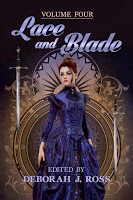 Just in time for Valentine's Day, Lace and Blade 4 offers a bouquet of sensual, romantic, action-filled stories. Order it from online booksellers in ebook and paperback editions. The Table of Contents is here.
Just in time for Valentine's Day, Lace and Blade 4 offers a bouquet of sensual, romantic, action-filled stories. Order it from online booksellers in ebook and paperback editions. The Table of Contents is here.Deborah J. Ross: Tell us a little about yourself. How did you come to be a writer?
Marie Brennan: I generally credit that to Diana Wynne Jones, and specifically her novel Fire and Hemlock, which I read when I was nine or ten years old. The main characters in it are writing a story together, and when I put the book down, I thought, I want to be a writer. It was the first time I recall thinking about making up stories, not just for my own entertainment, but for other people to read. I got serious about it when I was eighteen, sold my first novel when I was twenty-four, and have never looked back.
DJR: What inspired your story in Lace and Blade 4?
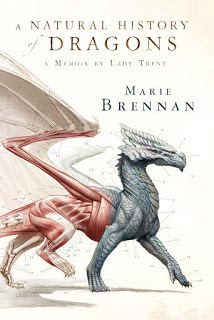 MB: Some years ago I bought a pair of black-and-red beaded earrings from the jeweler Elise Matthesen, who habitually gives titles to all the pieces she makes. The earrings are called "At the Sign of the Crow and Quill," and like many authors, I pledged to Elise that I would try to write something by that title someday. The mood that evoked in my mind was very much a Lace and Blade mood, so when I received an invitation to submit to the anthology, that turned out to be the spark I needed to transform the phrase into characters and plot.
MB: Some years ago I bought a pair of black-and-red beaded earrings from the jeweler Elise Matthesen, who habitually gives titles to all the pieces she makes. The earrings are called "At the Sign of the Crow and Quill," and like many authors, I pledged to Elise that I would try to write something by that title someday. The mood that evoked in my mind was very much a Lace and Blade mood, so when I received an invitation to submit to the anthology, that turned out to be the spark I needed to transform the phrase into characters and plot.DJR: What has most influenced your writing?
MB: Definitely my academic background. In college I majored in archaeology and folklore; in grad school it was cultural anthropology and folklore. I never took a single creative writing course. I know that some people find them great; if you have a good teacher you can grow enormously as a writer, and even without that, just having permission to treat writing as something important, rather than just a hobby, can be vital. But for me, the most effective thing was to take classes and read books that gave me something to write about. The real world, in all its multifarious historical and geographical and cultural glory, is an endless source of inspiration to me.
DJR: How does your writing process work?
MB: I am such a night owl. Sucha night owl. As I type these words, it's almost 11:30 at night, and this is the warm-up work I'm doing before settling in to put more words on the current story. I'll probably go to bed between 2 and 3 a.m. This has been my habit since college, and I've been lucky that, barring a few summer jobs with very early start times, I've been able to maintain my preferred schedule for basically my entire adult life.
As for the stories themselves, I am much more of a discovery writer than an outliner, though lately I've been working on some collaborative projects where outlining is a necessity. I can do that if I have to, but I prefer when possible to figure out my story as I go along -- that way I stay excited about it, rather than feeling like I'm just filling in the blanks.
DJR: What have you written recently? What lies ahead?
MB: Right now I'm freelancing for the game Legend of the Five Rings, gearing up for a standalone sequel to my previous series, the Memoirs of Lady Trent, and working on a Sekrit Projekt I can't tell you about. But oh man, the number of ideas on my plate -- it's absurd, honestly. My agent has three different novels or series out on submission right now, and a new idea mugged me just the other day, which I'm so excited about that if one of those three doesn't sell, my disappointment may well be outweighed by the fact that it means I get to tackle the new idea sooner.
DJR: What advice would you give an aspiring writer?
MB: Don't give up. It's pretty standard advice, but that's because it's one of the most important things to remember. I have nothing against self-publishing -- I belong to an authors' publishing collective, Book View Café, precisely because I know that not everything fits into the traditional model, nor is that the right path for every author -- but there's something to be said for rejection, for sending out your short stories or novels to editors and trying to clear the bar they've set. It's like weight-lifting: if you only ever lift weights that are easy for you, you won't build much strength. Rejections can be a challenge, a dare for you to better. Revise that story, or write a new one, and keep on trying. Don't give up.
Marie Brennan is a former anthropologist and folklorist who shamelessly pillages her
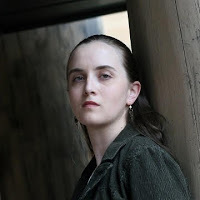 academic fields for material. She most recently misapplied her professors' hard work to the Victorian adventure series The Memoirs of Lady Trent; the first book of that series, A Natural History of Dragons, was a finalist for the World Fantasy Award and won the Prix Imaginales for Best Translated Novel. She is also the author of the Doppelganger duology of Warrior and Witch, the urban fantasies Lies and Prophecy and Chains and Memory, the Onyx Court historical fantasy series, the Varekai novellas, and nearly fifty short stories. For more information, visit www.swantower.com.
academic fields for material. She most recently misapplied her professors' hard work to the Victorian adventure series The Memoirs of Lady Trent; the first book of that series, A Natural History of Dragons, was a finalist for the World Fantasy Award and won the Prix Imaginales for Best Translated Novel. She is also the author of the Doppelganger duology of Warrior and Witch, the urban fantasies Lies and Prophecy and Chains and Memory, the Onyx Court historical fantasy series, the Varekai novellas, and nearly fifty short stories. For more information, visit www.swantower.com.
Published on February 05, 2018 01:00
January 31, 2018
Today's Moment of Serenity
Published on January 31, 2018 01:00
January 30, 2018
Today's Wisdom from Middle Earth
“It is useless to meet revenge with revenge; it will heal nothing.”
― J.R.R. Tolkien, The Return of the King
― J.R.R. Tolkien, The Return of the King

Published on January 30, 2018 01:00
January 29, 2018
Lace and Blade 4 Author Interview: Doranna Durgin
 Just in time for Valentine's Day, Lace and Blade 4 offers a bouquet of sensual, romantic, action-filled stories. Order it from online booksellers in ebook and paperback editions. The Table of Contents is here.
Just in time for Valentine's Day, Lace and Blade 4 offers a bouquet of sensual, romantic, action-filled stories. Order it from online booksellers in ebook and paperback editions. The Table of Contents is here.Doranna Durgin interview
Deborah J. Ross: Tell us a little about yourself. How did you come to be a writer?
Doranna Durgin: I didn’t “come to be” a writer—I was always a writer. I put my first little book together in first grade and never stopped, and wrote my first novel in 7thgrade (Illustrated. About a Collie, if you must know.) At that point I was writing daily by hand (in very particular lined notebooks with very particular pencils that I didn’t give up until I realized that pencil fades) and submitting with the naïve confidence of youth. I didn’t switch to the typewriter until after college, and boy howdy, you should have seen me when I sat down in front of my first word processor (Atari!).
I guess the point is, I started and I never stopped. I don’t suppose I ever will.
DJR: What inspired your story in Lace and Blade 4?
 DD: Oh, there was no way I wasn’t going to stump Kelyn, my straightforward sword & sorcery heroine, with social strictures and subtleties—especially not when I’m in the middle of writing a sequel (Rings of Ranadir) for her first book (Wolverine’s Daughter). I figured it would be gleeful rubbing-hands-together fun, and it was! There might be some sly thoughtfulness in there, too. I’m not saying.
DD: Oh, there was no way I wasn’t going to stump Kelyn, my straightforward sword & sorcery heroine, with social strictures and subtleties—especially not when I’m in the middle of writing a sequel (Rings of Ranadir) for her first book (Wolverine’s Daughter). I figured it would be gleeful rubbing-hands-together fun, and it was! There might be some sly thoughtfulness in there, too. I’m not saying.DJR: Why do you write what you do, and how does your work differ from others in your genre?DD: I write what I do because it’s all inside me, and possibly I would explode if I didn’t find a way to let it out. And I also write what I do because authors before me have made me feel the wonder of their worlds, and I want more than anything to share the wonders I feel from my stories, too. And I write because I want to explore and reveal things I think are important—things we’ve forgotten about our world, through alternative lenses.
How my work differs as I go about that is, I think, a reflection of how and where I’ve always lived—I’m an environmental ed major and former park naturalist who’s always lived as close to the real world as possible. Once upon a time, that meant a log cabin on a hundred acres of Appalachian mountainside where I interacted with more critters than humans. Since then I’ve immersed myself in the land on SW Virginia farm acreage (and spent my summers sleeping in a wee tent anyway) followed by rural high altitude desert foothills. Always close to my animals—horses and dogs--and training them, an avocation that led me to the current pack of four that includes the most highly performance-titled Beagle breed champion in the nation and two more who are right on his heels. I think this immersion—combined with a neurosensory syndrome—provides a framework for my work that likely differs from other approaches.
DJR: What have you written recently? What lies ahead?DD: My writing is in a transition phase. I’ve recently stepped away from traditional publishing—bought out a contract when publisher restrictions meant I couldn’t do with the book what the book needed done. Now I have so many projects on my list, it’s hard to know where to go first. But there will be more for Kelyn, definitely a return to fantasy and a number of heart books that have been waiting, and more for Dale & Sully (a mystery series with a vet and his Beagle companion that I swear, I started before I actually had Beagles. The prescience of me). I also recently released the third book in the Reckoners trilogy on top of significantly enhanced Author’s Cuts of the first two books. I love, love, love that indie publishing has allowed me to do this, after nearly fifty traditional books’ worth of bowing to publisher roadmaps.
DJR: What advice would you give an aspiring writer?DD: The same advice I’ve always given, even as the market changes: Write lots of what you’re driven to write, know the market, know the different publishing paths, and know which choice is best for you before you make it. Set your sights first, then figure out your plan for getting there, and then go after it.
Doranna Durgin is an award-winning author whose quirky spirit has led to an extensive
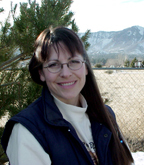 publishing journey across genres, across publishers, and across publishing lines. Beyond that, she hangs around outside her Southwest mountain home with horse and highly accomplished competition dogs. She doesn’t believe in mastering the beast within, but in channeling its power. For good or bad has yet to be decided.
publishing journey across genres, across publishers, and across publishing lines. Beyond that, she hangs around outside her Southwest mountain home with horse and highly accomplished competition dogs. She doesn’t believe in mastering the beast within, but in channeling its power. For good or bad has yet to be decided.
Published on January 29, 2018 01:00
January 26, 2018
In Troubled Times: George Washington on Political Parties and the Abuse of Power
 In light of the political events of recent times, I offer these words from George Washington's highly prescient Farewell Address.
In light of the political events of recent times, I offer these words from George Washington's highly prescient Farewell Address. United States 19th September 1796
Friends, & Fellow--Citizens.
I have already intimated to you the danger of Parties in the State, with particular reference to the founding of them on Geographical discriminations. Let me now take a more comprehensive view, & warn you in the most solemn manner against the baneful effects of the Spirit of Party, generally.
This Spirit, unfortunately, is inseperable from our nature, having its root in the strongest passions of the human Mind. It exists under different shapes in all Governments, more or less stifled, controuled, or repressed; but in those of the popular form it is seen in its greatest rankness and is truly their worst enemy.
The alternate domination of one faction over another, sharpened by the spirit of revenge natural to party dissention, which in different ages & countries has perpetrated the most horrid enormities, is itself a frightful despotism. But this leads at length to a more formal and permanent despotism. The disorders & miseries, which result, gradually incline the minds of men to seek security & repose in the absolute power of an Individual: and sooner or later the chief of some prevailing faction more able or more fortunate than his competitors, turns this disposition to the purposes of his own elevation, on the ruins of Public Liberty.
Without looking forward to an extremity of this kind (which nevertheless ought not to be entirely out of sight) the common & continual mischiefs of the spirit of Party are sufficient to make it the interest and the duty of a wise People to discourage and restrain it.
It serves always to distract the Public Councils and enfeeble the Public Administration. It agitates the Community with ill founded Jealousies and false alarms, kindles the animosity of one part against another, foments occasionally riot & insurrection. It opens the door to foreign influence & corruption, which find a facilitated access to the government itself through the channels of party passions. Thus the policy and the will of one country, are subjected to the policy and will of another.
There is an opinion that parties in free countries are useful checks upon the Administration of the Government and serve to keep alive the spirit of Liberty. This within certain limits is probably true--and in Governments of a Monarchical cast Patriotism may look with endulgence, if not with favour, upon the spirit of party. But in those of the popular character, in Governments purely elective, it is a spirit not to be encouraged. From their natural tendency, it is certain there will always be enough of that spirit for every salutary purpose. And there being constant danger of excess, the effort ought to be, by force of public opinion, to mitigate & assuage it. A fire not to be quenched; it demands a uniform vigilance to prevent its bursting into a flame, lest instead of warming it should consume.

Published on January 26, 2018 01:00
January 24, 2018
Today's Moment of Serenity
Published on January 24, 2018 01:00
January 23, 2018
Today's Wisdom from Middle Earth
"Never laugh at live dragons."
-- J.R.R. Tolkien, The Hobbit
-- J.R.R. Tolkien, The Hobbit

Published on January 23, 2018 01:00
January 22, 2018
Lace and Blade 4 Author Interview: Heather Rose Jones
 Just in time for Valentine's Day, Lace and Blade 4 offers a bouquet of sensual, romantic, action-filled stories. Order it from online booksellers in ebook and paperback editions. The Table of Contents is here.
Just in time for Valentine's Day, Lace and Blade 4 offers a bouquet of sensual, romantic, action-filled stories. Order it from online booksellers in ebook and paperback editions. The Table of Contents is here.Deborah J. Ross: Tell us a little about yourself. How did you come to be a writer?
Heather Rose Jones: I’ve been writing in some form or another most of my life, whether stories, songs, or poetry. I’ve always loved working with language. So it’s hard to point to any particular time point or process of “becoming a writer.” It’s a bit easier to talk about how I came to be a published writer. For that, I got a solid push by getting to know various other published science fiction and fantasy authors in the SF Bay Area, whic got me used to the idea that it was a possible thing to move from having written something to getting it published. My first short stories appeared in the Sword and Sorceress anthology series back in the 1990s. I was working on some novels at that time that still sit in file folders, but my first published book series is one I didn’t start working on until after I’d finished my mid-life PhD and decided I needed an entirely new approach to my fiction writing.
DJR: What inspired your story in Lace and Blade 4?
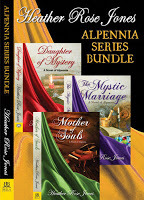 HRJ: “Gifts Tell Truth” is set in the same world as my Alpennia series: a mildly alternate Ruritanian early 19th century with magic. One of the things I love to do when exploring characters it to make offhand references to events in their past. Events where I may not know all the details of what happened, just that it shaped them in some way. One thing that is very clear about Jeanne, Vicomtesse de Cherdillac, one of the protagonists of The Mystic Marriage and a continuing character throughout the series, is that she is a “Woman With A Past.” The more I write about her, the more fascinated I am by how she came to be the person she is in the novels.
HRJ: “Gifts Tell Truth” is set in the same world as my Alpennia series: a mildly alternate Ruritanian early 19th century with magic. One of the things I love to do when exploring characters it to make offhand references to events in their past. Events where I may not know all the details of what happened, just that it shaped them in some way. One thing that is very clear about Jeanne, Vicomtesse de Cherdillac, one of the protagonists of The Mystic Marriage and a continuing character throughout the series, is that she is a “Woman With A Past.” The more I write about her, the more fascinated I am by how she came to be the person she is in the novels.The events in “Gifts Tell Truth” haven’t been specifically referenced in the books, other than a passing comment about how the stories of her youth aren’t appropriate for innocent ears. But I knew in a general way that during the French occupation of Alpennia, just after Jeanne’s unexpected marriage to a much older French aristocratic émigré, she led a wild and scandalous life, spurred on by a tragic event in her coming-out season (which will be told in a later story). The current story grew out of wanting to explore the origins of some of her later attitudes and reflexes, with the added bonus of showing the start of an odd but enduring friendship that features in the novels.
DJR: What authors have most influenced your writing? What about them do you find inspiring?
HRJ: I always have a hard time talking about influences. It’s not that I don’t think I have them, or that I think I’m a “self-made” writer, but I spent so many years simply devouring so many good (and not so good) books that I don’t know that I could identify my conscious influences. It’s a bit like the majority of my historic background research: I’m constantly tossing material into the compost heap, and when I need the fertilizer to grow a story in, there it is, but it’s digested and changed. If we’re talking about stylistic influences, the only ones I can point to with any certainty are the short stories I’ve written in imitation of various genres of medieval literature.
But I can identify some writers who inspire me in terms of the shape of their career. Writers who are being a direct inspiration by encouraging me when I feel like the publishing world doesn’t have a place I fit into. That would be people like Kate Elliott and Beth Bernobich and Melissa Scott. I’m going to stop with the first three that came to mind because otherwise I’ll worry too much about who I’m leaving out. The non-author who most inspires my writing is the proprietor of the website People of Color in European Art History. Just as she is doing with people of color, I’m trying to write queer stories back into the history they were always present in.
DJR: Why do you write what you do, and how does your work differ from others in your genre?
HRJ: It’s almost a cliché, but I’m writing the books that I wanted to read that nobody was writing for me. I’m writing fantasies about smart, geeky women in historical settings, whose lives (and loves) revolve around other women, and who are subverting the patriarchy, not in dramatic ways, but simply by supporting each other in their various endeavors.
To discuss how my work differs from others in my genre, first I have to decide which of my genres I’m comparing it to. My novels are published by a lesbian press (Bella Books) which primarily focuses on contemporary romance. This might seem an odd fit, but when I was deciding where to send my first novel, I looked around and couldn’t find any mainstream fantasy publisher that was putting out anything that looked like what I was writing. And I heard all the stories about writers being told to de-queer their characters, or only being offered contracts for the ones with straight storylines.
To some extent, it’s still hard to find anything quite like my books today. I’m writing quiet, thinky fantasies-of-manners that just happen to feature a slate of queer women as protagonists. If you took my books and made the characters straight, I could give you comparables. If you made my characters a lot more edgy and transgressive, I could give you comparables. The field has shifted, though, and I think today I might have taken a different path.
If you’re comparing my work to the lesbian fiction genre, one big difference is that romance is only one of the many threads woven through the stories, rather than being the major focus. But I think a bigger difference is that my work is more in conversation with mainstream fantasy than with the SFF side of lesbian publishing. It’s a matter of flavor and structure, more than subject matter.
DJR: How does your writing process work?
HRJ: I always tell people that when I’ve settled down into a single writing process, I’ll let you know. I’ve had a different process for each of my books and expect it will continue to change. The most significant logistical aspect of writing for me is fitting it in around my day job (which I absolutely love and which is a constant source of inspiration to me) and my commute. So my current process is to get up very early in the morning and dictate a scene into a handheld recorder while driving in to work. Then I stop off in a coffee shop for an hour or two, transcribe the dictation, clean up any plot notes from the day before, and do some blogging. If I get snippets of dialogue or text or even simply plot ideas during the work day, I e-mail them to myself to include in the next work session.
I tend to work best as a “start to finish” writer. I do a very ugly first draft, full of placeholders and notes and redundancies. I try to avoid doing any revision until I have something that’s functionally complete. For my first novel I was so much of a pantser that I had no idea how the story was going to come out for the first half of the draft. Now I tend to be more in control of the big picture, but I still avoid thinking ahead in too much detail. I tend to lose the crispness if I run the movies in my head too much before writing them down.
After that, there are a lot of revisions and generally two rounds with beta readers and subject matter experts before the story goes out the door to anyone else. I enjoy revising, almost more than I enjoy drafting. At that point the clay is all made and I get to work on the pottery.
DJR: What have you written recently? What lies ahead?
HRJ: At the time I’m writing this I have two active projects. The fourth Alpennia novel, Floodtide, has its ugly first draft and is resting a bit before I start the revisions. I’m trying to take a slightly different genre angle with each book in the series and this one is meant to be something of a young adult story that can be an independent introduction to the series. The second current project is probably going to end up a novella. It’s called “The Language of Roses” and started off as a cynical reaction to yet one more Beauty and the Beast interpretation. I’m trying to see how dark I can get. I don’t have a lot of practice in writing dark.
As for what lies ahead, the Alpennia series is planned to be at least seven novels total, plus an assortment of short fiction to fill in some gaps. I have plenty of other ideas for novels, but a lot depends on where I want to take my career when I’m done with Alpennia. I’ve been trying to write more short fiction, too. I have a quartet of stories inspired by the medieval Welsh Mabinogi (with lesbians), of which two have been written and published by Podcastle. I have my stories from Sword and Sorceress that I plan to self-publish as a collection with a concluding novelette, which is waiting for me to have the time to work on the logistical parts.
And through it all, I’m constantly working on the Lesbian Historic Motif Project and its associated podcast, which is intended as a research resource for people writing queer women in historic settings.
DJR: What advice would you give an aspiring writer?
HRJ: There’s all the usual advice, like “seek out good writing and study it” or “a writer writes, so start writing and you aren’t ‘aspiring’ any more.” But in the current state of the field, I think an important piece of advice for new writers is to have patience. Not meaning to sound like an old fogey (though of course I do), but your first book isn’t necessarily going to be worth publishing. In fact it probably won’t be. That’s ok. That’s not failure, it’s part of practicing to be better. A lot of aspiring writers think that their first book needs to go out into the market no matter what. If you can’t get an agent or a publisher interested, then publish it yourself. Self-publishing has become incredibly easy, and that can be a good thing. But just because something is easy doesn’t mean it’s a good idea. How do you push yourself to improve if you think that your first efforts are good enough? If you picked up a violin and played it for the first time, would the result be good enough to be recorded? When you pick up a paintbrush for the first time, do you expect the result to be hung in a gallery? Writing is a craft; it takes effort and practice and analysis. Have the patience and persistence to learn your craft well.
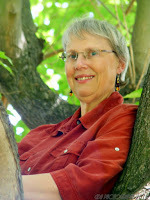 Heather Rose Jones is the author of the Alpennia historic fantasy series: an alternate-Regency-era Ruritanian adventure revolving around women’s lives woven through with magic, alchemy, and intrigue. The series so far consists of Daughter of Mystery, The Mystic Marriage, and Mother of Souls as well as some shorter pieces. Heather blogs about research into lesbian-like motifs in history and literature at the Lesbian Historic Motif Project and writes both historical and fantasy fiction based on that research. Her short fiction has appeared in Sword and Sorceress and at Podcastle.org. She works as an industrial failure investigator in biotech.
Heather Rose Jones is the author of the Alpennia historic fantasy series: an alternate-Regency-era Ruritanian adventure revolving around women’s lives woven through with magic, alchemy, and intrigue. The series so far consists of Daughter of Mystery, The Mystic Marriage, and Mother of Souls as well as some shorter pieces. Heather blogs about research into lesbian-like motifs in history and literature at the Lesbian Historic Motif Project and writes both historical and fantasy fiction based on that research. Her short fiction has appeared in Sword and Sorceress and at Podcastle.org. She works as an industrial failure investigator in biotech.
Published on January 22, 2018 01:00









